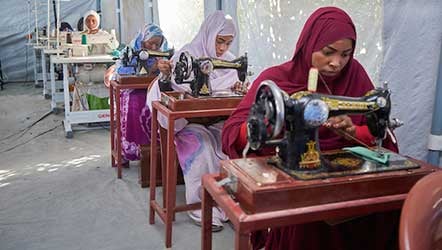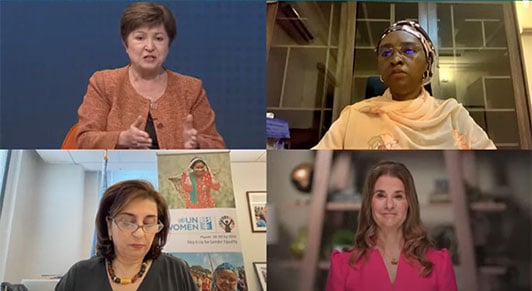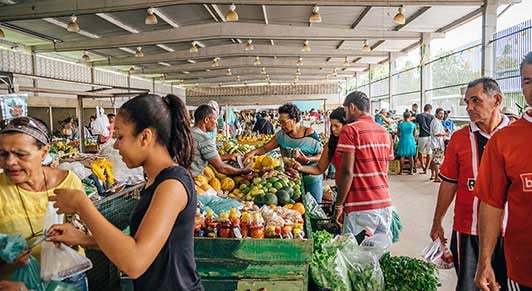Gender

Despite significant progress in recent decades, labor markets across the world remain divided along gender lines. Female labor force participation has remained lower than male participation, gender wage gaps are high, and women are overrepresented in the informal sector and among the poor. In many countries, legal restrictions persist which constrain women from developing their full economic potential. While equality between men and women is in itself an important development goal, women's economic participation is also a part of the growth and stability equation. In rapidly aging economies, higher female labor force participation can boost growth by mitigating the impact of a shrinking workforce. Better opportunities for women can also contribute to broader economic development in developing economies, for instance through higher levels of school enrollment for girls.
Adequate Reserves Shield Economies From Shocks and Strengthen Resilience
Building foreign exchange reserves requires sound policies and takes time, but global efforts to lower the cost of holding them can help
Debt Confronts Policymakers With Difficult Trade-offs
There are few elegant, easy, or politically attractive ways to reduce debt
Stock-Bond Diversification Offers Less Protection From Market Selloffs
Diversification has become harder since 2020 as stocks and bonds tend to move in tandem during sharp selloffs, adding to financial stability concerns
Global Economy Shakes Off Tariff Shock Amid Tech-Driven Boom
But risks are rising, including from the concentration of tech investment and the negative effects of trade disruptions, which may build over time
New Skills and AI Are Reshaping the Future of Work
Policy choices will determine whether workers and firms are adequately prepared for the AI revolution
Top 10 Blogs of 2025
Debt, Stablecoins, AI, and Global Economy’s New Era Drew Blog Readers
The IMF’s World Revenue Longitudinal Database: 2026 Update
This note presents the key updates and revenue development highlights of the 2026 version of the IMF's World Revenue Longitudinal Database (WoRLD), a comprehensive dataset that tracks government revenue trends since the early 1980s, using the classification of the Government Finance Statistics Manual. With data for 195 countries, including 191 IMF member countries, WoRLD provides policymakers, researchers, and the public with invaluable insights into the evolution of the level and composition of revenues and tax revenues. Key updates for the 2026 publication include extending country coverage to Aruba and Liechtenstein and time coverage to 2024.
Pension Reform in Comoros: Union of the Comoros
This paper assesses the financial outlook of the pension system in Comoros based on recent actuarial analyses and examines reform options. It documents structural imbalances arising from system design features, limited contributor coverage, and demographic dynamics, which are projected to generate increasing financing pressures over time. The analysis identifies the key drivers of projected deficits and evaluates policy measures to restore financial sustainability, including parametric adjustments and institutional strengthening. As one of the first comprehensive actuarial-based assessments of pension reform in a fragile state context, the paper provides an analytical framework to support reform sequencing while safeguarding social protection objectives and improving system efficiency.
Tax and Expenditure Policies in Comoros: Distributive Effects Using Micro-Simulations
This paper assesses the distributional impact of tax and expenditure policies in Comoros using a microsimulation framework based on the Commitment to Equity (CEQ) methodology and household survey data. It evaluates key revenue-raising reforms under the IMF Extended Credit Facility and post-WTO accession, including tax base broadening, the removal of tax expenditures, and changes in border taxation. The analysis also examines the incidence of fuel subsidies. Results show that while proposed reforms effectively increase revenues, their impact on inequality is limited. Tax exemptions and fuel subsidies are found to be regressive, disproportionately benefiting higher-income households, highlighting the need for better-targeted redistribution mechanisms.
Republic of Serbia: Building A Framework for Tax Expenditures Reporting
This technical assistance report responds to the Republic of Serbia’s request for a comprehensive framework to report tax expenditures across the personal income tax (PIT), corporate income tax (CIT), and value-added tax (VAT). It defines benchmark tax systems for these three major taxes, outlines methodologies for estimating associated tax expenditures, and provides preliminary results. The analysis shows that VAT-related tax expenditures represent the largest fiscal cost, followed by PIT and CIT. VAT benefits are disproportionately captured by higher-consumption households, while CIT benefits are heavily concentrated among a small number of large firms. The report recommends institutionalizing regular tax expenditure reporting, improving data governance and inter-agency coordination, and strengthening capacity for microsimulation modeling to support ongoing fiscal analysis and enhance transparency.
Gabon: Technical Assistance Report-Technical Assistance for the Development of a Macroeconomic Model for Projection and Simulations-Scoping Mission
[Please note this report is only available in French] This technical assistance report documents the key phases of the scoping mission for the development of a macroeconomic model based on financial programming, conducted in Libreville from May 5 to 15, 2025, on behalf of the Ministry of Economy and Participations of Gabon. The mission undertook a comprehensive assessment of existing analytical tools and data quality, alongside delivering targeted training on financial programming and debt analysis. The exercise highlighted various areas to strengthen the current tools as well as organizational constraints to be addressed to improve performance. Building on these findings, a series of recommendations were formulated, endorsed by the authorities, and subsequently integrated into the project’s action plan. These recommendations propose a step-by-step strategy for the development of a customized macroeconomic model, fully integrated with a Debt Dynamics Tool (DDT), and supported by continuous capacity building and strengthened inter-institutional coordination, aimed at enhancing the robustness of economic analysis and fostering improved evidence-based decision-making processes.
List of IMF Member Countries with Delays in Completion of Article IV Consultations or Mandatory Financial Stability Assessments over 18 Months
In line with the framework for addressing excessive delays in the completion of Article IV consultations, the following table lists the IMF members for whom the Article IV consultation has been delayed by more than 18 months as of December 31, 2025.
Growth Challenges and Policy Priorities in Mozambique
Mozambique’s economy has slowed sharply since 2016 with two-thirds of the population below the poverty line. While over half a million young people enter the job market annually, job creation remains weak, as structural transformation has favored extractive industries (in particular, capital-intensive LNG projects) over manufacturing. Agriculture, employing three-quarters of the population, suffers from low productivity and limited access to inputs and finance. Informality dominates, accounting for about 95 percent of jobs. Human development indicators are among the world’s lowest, with fiscal pressures constraining social and development spending. To tackle Mozambique’s growth challenges, reforms must promote economic diversification, job-rich growth, agricultural modernization, improved governance, and expanded access to finance.
A Novel Quarterly Macroeconomic Forecasting Framework: Illustration on the Case of Bosnia and Herzegovina
This paper describes the Quarterly Macro Forecasting Framework (QMFF), which is a novel approach to macroeconomic policy analysis and forecasting. At the core of this framework is a Quarterly Projection Model, with main behavioral equations quantified as deviations of real variables from their trends. The model comprises a simultaneous system of calibrated equations that cover the main sectors of the Financial Programming and Policies framework, as well as key accounting restrictions within and across sectors. By explicitly accounting for trends observed in real variables and relative prices, the framework ensures a balanced growth path and constant expenditure shares relative to nominal GDP. The QMFF is sufficiently flexible to be adapted to different monetary frameworks and exchange rate regimes. After describing the framework, the paper illustrates its implementation for policy analysis and forecasting on the case of Bosnia and Herzegovina. The empirical work with the model includes not only calibration but also testing the model’s dynamic and in-sample simulation properties.
Adequate Reserves Shield Economies From Shocks and Strengthen Resilience
Building foreign exchange reserves requires sound policies and takes time, but global efforts to lower the cost of holding them can help
Debt Confronts Policymakers With Difficult Trade-offs
There are few elegant, easy, or politically attractive ways to reduce debt
Stock-Bond Diversification Offers Less Protection From Market Selloffs
Diversification has become harder since 2020 as stocks and bonds tend to move in tandem during sharp selloffs, adding to financial stability concerns
Global Economy Shakes Off Tariff Shock Amid Tech-Driven Boom
But risks are rising, including from the concentration of tech investment and the negative effects of trade disruptions, which may build over time
New Skills and AI Are Reshaping the Future of Work
Policy choices will determine whether workers and firms are adequately prepared for the AI revolution
Top 10 Blogs of 2025
Debt, Stablecoins, AI, and Global Economy’s New Era Drew Blog Readers
The IMF’s World Revenue Longitudinal Database: 2026 Update
This note presents the key updates and revenue development highlights of the 2026 version of the IMF's World Revenue Longitudinal Database (WoRLD), a comprehensive dataset that tracks government revenue trends since the early 1980s, using the classification of the Government Finance Statistics Manual. With data for 195 countries, including 191 IMF member countries, WoRLD provides policymakers, researchers, and the public with invaluable insights into the evolution of the level and composition of revenues and tax revenues. Key updates for the 2026 publication include extending country coverage to Aruba and Liechtenstein and time coverage to 2024.
Pension Reform in Comoros: Union of the Comoros
This paper assesses the financial outlook of the pension system in Comoros based on recent actuarial analyses and examines reform options. It documents structural imbalances arising from system design features, limited contributor coverage, and demographic dynamics, which are projected to generate increasing financing pressures over time. The analysis identifies the key drivers of projected deficits and evaluates policy measures to restore financial sustainability, including parametric adjustments and institutional strengthening. As one of the first comprehensive actuarial-based assessments of pension reform in a fragile state context, the paper provides an analytical framework to support reform sequencing while safeguarding social protection objectives and improving system efficiency.
Tax and Expenditure Policies in Comoros: Distributive Effects Using Micro-Simulations
This paper assesses the distributional impact of tax and expenditure policies in Comoros using a microsimulation framework based on the Commitment to Equity (CEQ) methodology and household survey data. It evaluates key revenue-raising reforms under the IMF Extended Credit Facility and post-WTO accession, including tax base broadening, the removal of tax expenditures, and changes in border taxation. The analysis also examines the incidence of fuel subsidies. Results show that while proposed reforms effectively increase revenues, their impact on inequality is limited. Tax exemptions and fuel subsidies are found to be regressive, disproportionately benefiting higher-income households, highlighting the need for better-targeted redistribution mechanisms.
Republic of Serbia: Building A Framework for Tax Expenditures Reporting
This technical assistance report responds to the Republic of Serbia’s request for a comprehensive framework to report tax expenditures across the personal income tax (PIT), corporate income tax (CIT), and value-added tax (VAT). It defines benchmark tax systems for these three major taxes, outlines methodologies for estimating associated tax expenditures, and provides preliminary results. The analysis shows that VAT-related tax expenditures represent the largest fiscal cost, followed by PIT and CIT. VAT benefits are disproportionately captured by higher-consumption households, while CIT benefits are heavily concentrated among a small number of large firms. The report recommends institutionalizing regular tax expenditure reporting, improving data governance and inter-agency coordination, and strengthening capacity for microsimulation modeling to support ongoing fiscal analysis and enhance transparency.
Gabon: Technical Assistance Report-Technical Assistance for the Development of a Macroeconomic Model for Projection and Simulations-Scoping Mission
[Please note this report is only available in French] This technical assistance report documents the key phases of the scoping mission for the development of a macroeconomic model based on financial programming, conducted in Libreville from May 5 to 15, 2025, on behalf of the Ministry of Economy and Participations of Gabon. The mission undertook a comprehensive assessment of existing analytical tools and data quality, alongside delivering targeted training on financial programming and debt analysis. The exercise highlighted various areas to strengthen the current tools as well as organizational constraints to be addressed to improve performance. Building on these findings, a series of recommendations were formulated, endorsed by the authorities, and subsequently integrated into the project’s action plan. These recommendations propose a step-by-step strategy for the development of a customized macroeconomic model, fully integrated with a Debt Dynamics Tool (DDT), and supported by continuous capacity building and strengthened inter-institutional coordination, aimed at enhancing the robustness of economic analysis and fostering improved evidence-based decision-making processes.
List of IMF Member Countries with Delays in Completion of Article IV Consultations or Mandatory Financial Stability Assessments over 18 Months
In line with the framework for addressing excessive delays in the completion of Article IV consultations, the following table lists the IMF members for whom the Article IV consultation has been delayed by more than 18 months as of December 31, 2025.
Growth Challenges and Policy Priorities in Mozambique
Mozambique’s economy has slowed sharply since 2016 with two-thirds of the population below the poverty line. While over half a million young people enter the job market annually, job creation remains weak, as structural transformation has favored extractive industries (in particular, capital-intensive LNG projects) over manufacturing. Agriculture, employing three-quarters of the population, suffers from low productivity and limited access to inputs and finance. Informality dominates, accounting for about 95 percent of jobs. Human development indicators are among the world’s lowest, with fiscal pressures constraining social and development spending. To tackle Mozambique’s growth challenges, reforms must promote economic diversification, job-rich growth, agricultural modernization, improved governance, and expanded access to finance.
A Novel Quarterly Macroeconomic Forecasting Framework: Illustration on the Case of Bosnia and Herzegovina
This paper describes the Quarterly Macro Forecasting Framework (QMFF), which is a novel approach to macroeconomic policy analysis and forecasting. At the core of this framework is a Quarterly Projection Model, with main behavioral equations quantified as deviations of real variables from their trends. The model comprises a simultaneous system of calibrated equations that cover the main sectors of the Financial Programming and Policies framework, as well as key accounting restrictions within and across sectors. By explicitly accounting for trends observed in real variables and relative prices, the framework ensures a balanced growth path and constant expenditure shares relative to nominal GDP. The QMFF is sufficiently flexible to be adapted to different monetary frameworks and exchange rate regimes. After describing the framework, the paper illustrates its implementation for policy analysis and forecasting on the case of Bosnia and Herzegovina. The empirical work with the model includes not only calibration but also testing the model’s dynamic and in-sample simulation properties.
Promoting Inclusive Growth and Gender Equality
In an era marked by rapid technological advancement and shifting global economic landscapes, the imperative for inclusive growth and gender equality has never been more critical.
International Women's Day 2024
Managing Director Kristalina Georgieva and World Food Programme Executive Director Cindy McCain discussed their personal career journeys, investing in women and girls, and more.
Empowering Women in the Global Economy
Kristalina Georgieva, Melinda French Gates, Hon. Zainab Ahmed, and Sima Sami Bahous discussed how the IMF, governments, and others can work together to help reduce gender gaps.
Toward Peak Population
Senior Advisor on Gender joined a panel discussion on the future of global population growth, and the pressures and opportunities it presents for women and girls.
Women in Finance
Discussion on why more women are needed in the financial sector, especially in leadership positions, and how this can help with financial sector stability and inclusive growth.
Gender Equality
"Gender Equality Boosts Economic Growth and Stability:" remarks by Gita Gopinath, IMF First Deputy Managing Director, delivered at the Korea Gender Equality Forum.
IMF Gender Strategy
At the Center for Global Development, IMF's Ratna Sahay presented the recently approved IMF Strategy Toward Mainstreaming Gender, followed by a panel discussion.
















